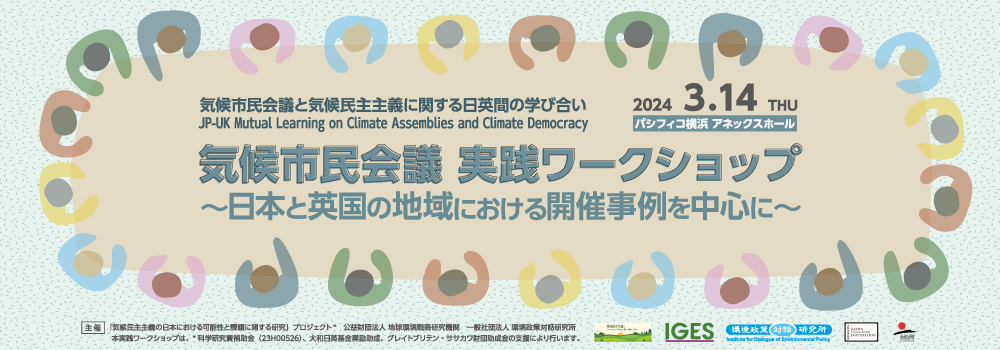活動の様子
[Recording available] Practical Workshop on Climate Assemblies: Featuring Local Cases in Japan and the UK

This event has concluded. A recording of the day is available for viewing.
Climate Citizens’ Assemblies are anticipated to be one way for various regions and countries to have a broad social consensus on promoting the transition to a decarbonised society. Climate Citizens’ Assemblies gather together randomly selected citizens to form a microcosm of society. Assembly members are given balanced information with which to deliberate and formulate policy recommendations. These assemblies have been spreading rapidly in European countries and municipalities since 2019, and have recently been held in Japan, mainly in the Tokyo metropolitan area, after being implemented in Sapporo in 2020.
This workshop invites Professor Stephen Elstub (Newcastle University, UK), who has been deeply involved in organising national and local Climate Citizens’ Assemblies as a leading expert in the UK. The workshop will bring together stakeholders involved in the practice and research of Climate Citizens’ Assemblies in Japan to share and discuss their experiences. In particular, several representative examples from Japan and the UK will be highlighted, and case studies will be conducted with participants on a wide range of aspects of the effective organisation of Climate Citizens’ Assemblies, with the aim of making more progress going forward.
We would like to extend an invitation to attend this workshop to any municipal officials, practitioners in related fields, researchers and other members of the public who may be interested in the organisation and use of Climate Citizens’ Assemblies.
Date/time 9:30-17:40, Thursday, 14 March 2024
Venue Annex Hall, Pacifico Yokohama (1-1-1, Minatomirai, Nishi-ku, Yokohama, Kanagawa)
Languages English and Japanese (Simultaneous interpretation)
Presentation Materials
Moderators:
Morning session: ISHIKAWA Tomoko, IGES
Afternoon session: TAKEUCHI Ayano, Toho University
Part Ⅰ (Plenary session)
9:30-9:45 Opening remarks
MIKAMI Naoyuki, Nagoya University
TAKAHASHI Yasuo, IGES
9:45-10:20 Keynote lecture “Recent developments of climate assemblies in the UK and Europe”
Stephen Elstub, Newcastle University handout
10:20-10:45 Presentation
Presentation 1 “Recent developments of climate assemblies in Japan”
MIKAMI Naoyuki handout
Presentation 2 “Recent development of climate assemblies in Kanagawa”
INADA Motoko, IDEP handout
11:00-12:10 Case report (1) Climate assemblies in Japan
Climate Assembly for Tokorozawa (Saitama)
SAITO Nobuhiro handout
Climate Assembly for Atsugi (Kanagawa)
ENDO Mutsuko handout
Climate Assembly for Zushi and Hayama (Kanagawa)
KATO Hiroshi handout
Climate Assembly for Tsukuba (Ibaraki)
TOKUDA Taro handout
12:10-13:00 Lunch break
13:00-13:25 Case report (2) Climate Assemblies in the UK
KAINUMA Mikiko and ISHIKAWA Tomoko, IGES handout
Part Ⅱ (Breakout session)
13:25-15:30 Group discussion
Focusing on the Japanese and UK cases presented in Part I
1. What worked well and what was accomplished (Achievements)
2. What seems to have gone wrong (Problems/issues)
3. According to the above points, how can we implement the climate assembly more meaningfully in Japan?
Part Ⅲ (Plenary session)
15:35-16:15 Sharing the results of the group discussion
16:15-17:30 Panel and general discussion
Panelists: Stephen Elstub, SAITO Nobuhiro, ENDO Mutsuko, KATO Hiroshi, TOKUDA Taro, Maggie Bosanquet (Durham County Council, UK), EMORI Seita (Tokyo University)
Facilitator: MIKAMI Naoyuki
17:30-17:40 Closing remarks
YAGISHITA Masaharu, IDEP
18:00-20:00 Reception (Fee for drinks: 3,000 yen)
Co-Organisers
“Research on the possibilities and challenges of climate democracy in Japan” Project
(JSPS KAKENHI (JP23H00526), led by Prof. MIKAMI Naoyuki, Nagoya University)
Institute for Global Environmental Strategies (IGES)
Institute for Dialogue of Environmental Policy (IDEP)
Contact
Climate Citizens Assembliese Workshop Executive Committee Secretariat
cca-secretariat@iges.or.jp
This practical workshop is held as part of “Japan-UK Mutual Learning on Climate Assemblies and Climate Democracy”, supported by JSPS KAKENHI (JP23H00526), the Daiwa Anglo-Japanese Foundation, and the Great Britain Sasakawa Foundation.



